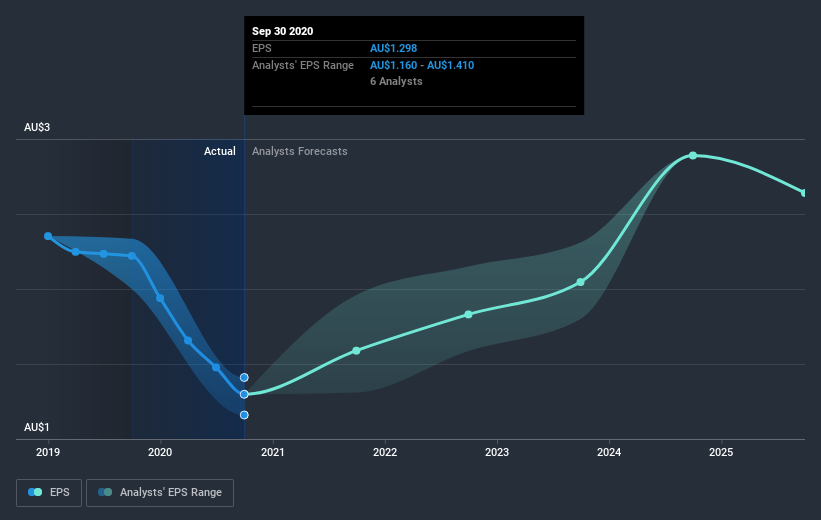What Type Of Returns Would Australia and New Zealand Banking Group's(ASX:ANZ) Shareholders Have Earned If They Purchased Their SharesThree Years Ago?
Australia and New Zealand Banking Group Limited (ASX:ANZ) shareholders should be happy to see the share price up 23% in the last quarter. But that cannot eclipse the less-than-impressive returns over the last three years. After all, the share price is down 23% in the last three years, significantly under-performing the market.
View our latest analysis for Australia and New Zealand Banking Group
To paraphrase Benjamin Graham: Over the short term the market is a voting machine, but over the long term it's a weighing machine. One imperfect but simple way to consider how the market perception of a company has shifted is to compare the change in the earnings per share (EPS) with the share price movement.
Australia and New Zealand Banking Group saw its EPS decline at a compound rate of 16% per year, over the last three years. In comparison the 8% compound annual share price decline isn't as bad as the EPS drop-off. So the market may not be too worried about the EPS figure, at the moment -- or it may have previously priced some of the drop in.
You can see below how EPS has changed over time (discover the exact values by clicking on the image).
Dive deeper into Australia and New Zealand Banking Group's key metrics by checking this interactive graph of Australia and New Zealand Banking Group's earnings, revenue and cash flow.
What About Dividends?
It is important to consider the total shareholder return, as well as the share price return, for any given stock. Whereas the share price return only reflects the change in the share price, the TSR includes the value of dividends (assuming they were reinvested) and the benefit of any discounted capital raising or spin-off. So for companies that pay a generous dividend, the TSR is often a lot higher than the share price return. As it happens, Australia and New Zealand Banking Group's TSR for the last 3 years was -10%, which exceeds the share price return mentioned earlier. This is largely a result of its dividend payments!
A Different Perspective
Investors in Australia and New Zealand Banking Group had a tough year, with a total loss of 7.2% (including dividends), against a market gain of about 2.2%. However, keep in mind that even the best stocks will sometimes underperform the market over a twelve month period. Longer term investors wouldn't be so upset, since they would have made 1.3%, each year, over five years. If the fundamental data continues to indicate long term sustainable growth, the current sell-off could be an opportunity worth considering. While it is well worth considering the different impacts that market conditions can have on the share price, there are other factors that are even more important. Even so, be aware that Australia and New Zealand Banking Group is showing 2 warning signs in our investment analysis , you should know about...
Of course Australia and New Zealand Banking Group may not be the best stock to buy. So you may wish to see this free collection of growth stocks.
Please note, the market returns quoted in this article reflect the market weighted average returns of stocks that currently trade on AU exchanges.
This article by Simply Wall St is general in nature. It does not constitute a recommendation to buy or sell any stock, and does not take account of your objectives, or your financial situation. We aim to bring you long-term focused analysis driven by fundamental data. Note that our analysis may not factor in the latest price-sensitive company announcements or qualitative material. Simply Wall St has no position in any stocks mentioned.
Have feedback on this article? Concerned about the content? Get in touch with us directly. Alternatively, email editorial-team@simplywallst.com.

 Yahoo Finance
Yahoo Finance 
